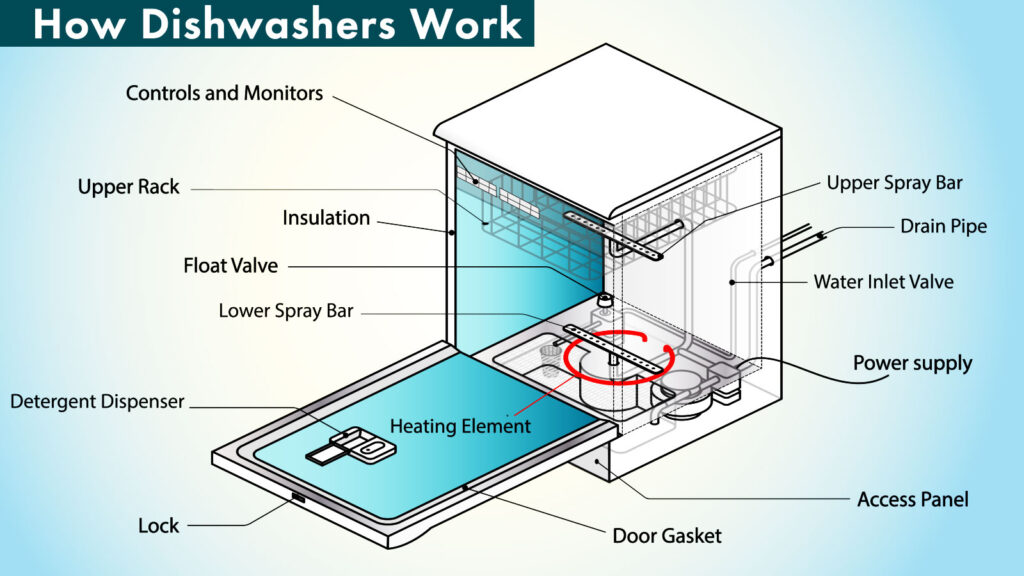Do you ever wonder how your dishwasher manages to get your dishes so clean? While the magic of detergent plays a role, the real secret weapon is heat. Most modern dishwashers are equipped with heating elements that raise the water temperature to effectively sanitize and clean your dishes. This heated water, typically reaching 120-140°F (49-60°C), helps eliminate bacteria and grease, ensuring sparkling clean results.
This article will delve into the fascinating world of dishwasher heating elements, exploring how they work, their benefits, and their impact on energy efficiency. We’ll also discuss whether your dishwasher needs a heating element or if it can rely on preheated tap water for optimal cleaning.
Dishwasher Heating Elements
At the heart of every dishwasher lies a heating element, a small but powerful component responsible for raising the water temperature to the ideal level for cleaning. These elements are typically located at the bottom of the dishwasher, near the wash pump. They come in various forms, including:
- Resistance Heating Elements: These elements work by converting electrical energy into heat through resistance. When electricity flows through the element, it encounters resistance, generating heat that warms the surrounding water.
- Immersion Heating Elements: These elements are directly submerged in the water and consist of a heating coil surrounded by an insulating material. As electricity passes through the coil, it heats the water directly.
How Heating Elements Work

The process of heating water in a dishwasher is relatively straightforward. When you start a cycle, the dishwasher’s control panel sends a signal to the heating element, activating it. The element then begins to generate heat, raising the temperature of the water within the wash tub.
The heating process is carefully controlled by a thermostat, which monitors the water temperature and shuts off the heating element once the desired temperature is reached. This ensures that the water doesn’t overheat and potentially damage your dishes or the dishwasher itself.
Factors Affecting Heating Time
Several factors can influence how long it takes for the dishwasher to heat the water:
- Initial Water Temperature: If you have preheated tap water, the heating element will need less time to reach the desired temperature.
- Dishwasher Capacity: Larger dishwashers with more water require longer heating times compared to smaller models.
- Heating Element Power: Dishwashers with higher-powered heating elements can heat water faster than those with lower wattage elements.
Benefits of Heated Water in Dishwashers
Heated water offers several advantages when it comes to cleaning your dishes:
- Enhanced Sanitization: Hot water effectively kills bacteria and germs, ensuring that your dishes are sanitized and safe to use. This is particularly important for items that come into contact with food, such as plates, bowls, and utensils.
- Improved Grease Removal: Heat helps break down grease and oil, making it easier to remove from dishes.
This results in a more thorough clean and prevents greasy residue from building up on your dishes over time.
* Faster Drying: Heated water evaporates faster than cold water, leading to quicker drying times for your dishes. This can help prevent water spots and streaks from forming on your glassware and silverware.
Energy Efficiency and Heating Elements

While heated water offers numerous benefits, it’s important to consider the energy consumption associated with heating elements.
Some modern dishwashers are designed to be more energy-efficient by utilizing preheated tap water or incorporating advanced heating technologies that minimize energy waste. When choosing a dishwasher, look for models with Energy Star certification, which indicates they meet strict energy efficiency guidelines.
Conclusion
Dishwasher heating elements play a crucial role in achieving sparkling clean and sanitized dishes. They effectively raise the water temperature to eliminate bacteria, grease, and food residue, ensuring your dishes are safe and hygienic. While heated water offers significant benefits, it’s important to choose an energy-efficient dishwasher model to minimize your environmental impact. By understanding how heating elements work and their impact on energy consumption, you can make informed decisions about your dishwasher purchase and contribute to a more sustainable lifestyle.



